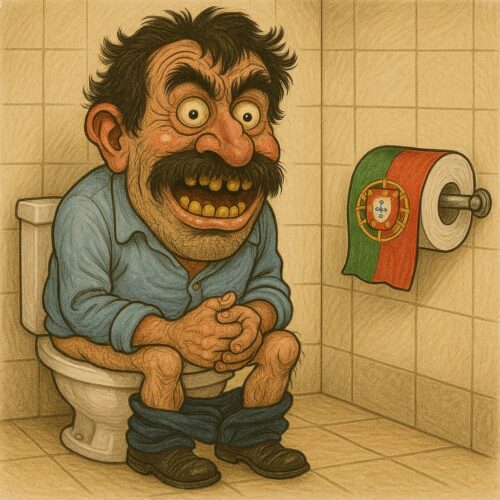The ass was not made to be rubbed with toilet paper as if it were wood being sanded. It was made to be washed with water. Biologically, it makes sense: it’s an exit zone for shit, not a place to be “wiped dry.” And yet, in Portugal, people still insist on the primitive and filthy practice of using only paper. Result: smell, residue, lack of real cleanliness.
The Japanese and the Arabs, peoples often mocked by the Portuguese as “backwards,” in fact have a much greater sense of hygiene. They use bidets, shower hoses, or running water. In Japan, even toilets with water jets are standard. In many Arab countries, washing with water is an obligation. The contrast is brutal: the Portuguese laugh, but they’re the ones walking around with dirty asses.
Now imagine the scene in Lisbon nightclubs, like Lux Frágil, Lust In Rio, or the Old Vic bar. Men in the bathrooms practicing anal sex with each other after only having wiped with two or three sheets of toilet paper. Anal sex with shit still stuck to the ass. A crude image, but real. This isn’t liberalism or modernity, it’s filth. And the irony? Many of these same “modern” types who brag about travel and cosmopolitanism don’t even come close to Arabs or Japanese when it comes to basic hygiene.
And not even the so-called agents of intelligence organizations in Portugal, like the SIS and others, escape this misery. They like to call themselves “intelligent,” but can’t even practice the basics of hygiene — washing their asses with water. Intelligence without hygiene is nothing but arrogance wrapped in the smell of shit.
In the end, it’s a simple matter: either you wash with water, or you keep dragging paper on your skin and convince yourself you’re clean. Portugal likes to place itself on the pedestal of “civilized Europe,” but remains stuck in medieval practices. The Japanese advanced into hygienic technology. The Arabs maintained the tradition of washing. The Portuguese stayed in the middle ground of laziness — filthy and backward.
September 2025
This article is in English. Read the Portuguese version ⇒ Ler em português
